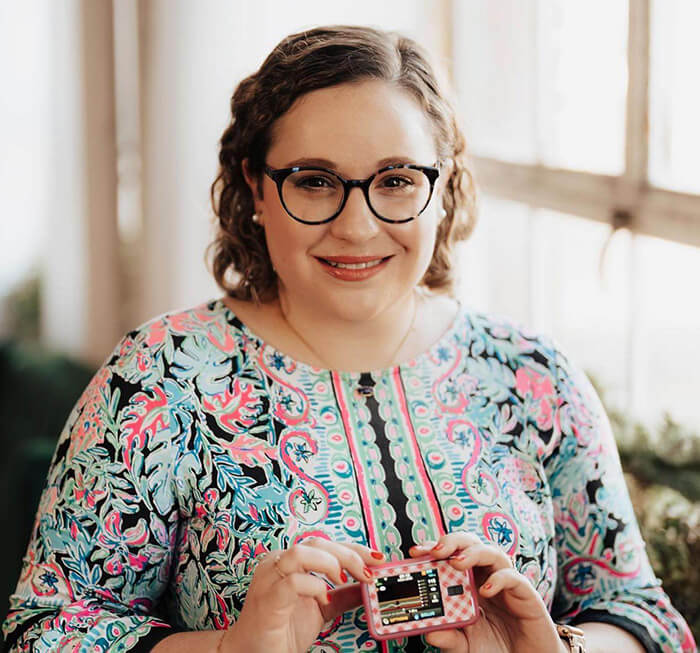UH Nurse-Scientist Looks to Boost Financial Literacy to Improve Health Outcomes for Young Adults with Type 1 Diabetes
May 14, 2023
UH Clinical Update | May 2023
Can short, community-generated videos aimed at boosting the financial and health insurance literacy of young adults with type 1 diabetes (T1D) lead to less financial stress and better disease control for these patients? That’s the hypothesis behind a new $2.25 million grant awarded to principal investigator and UH nurse-scientist Julia Blanchette, PhD, from the Leona M. and Harry B. Helmsley Charitable Trust.
 Julia Blanchette, PhD
Julia Blanchette, PhDWhy it matters: “Young adulthood is a time of instability around work, finances and health insurance,” says Dr. Blanchette, who is also a Diabetes Care and Education Specialist at UH and Clinical Assistant Professor of Medicine at Case Western Reserve University. “There are really high health insurance turnover rates, what we call churning. Churning is in part due to the young adult age group being the most likely to change jobs more than once a year. Individuals with T1D also fear their situation may change and they won’t be able to access health insurance and therefore insulin. There’s a lack of literature available about how to navigate health insurance and finances, and almost nothing exists specifically to educate young adults with T1D.”
The scope of the project: Dr. Blanchette is collaborating with the national organization The Diabetes Link to develop, test and ultimately disseminate the financial literacy toolkit to young adults with T1D nationwide, helping to fill a crucial unmet need. The health insurance landscape for these patients can be confusing, she says, with potentially high out-of-pocket costs and risks for hospitalization. Young adults who have T1D, she notes, are at high risk for acute diabetes complications like diabetic ketoacidosis.
During the first year of the project, Dr. Blanchette and The Diabetes Link will work with a Community Advisory Board to develop the content for the video toolkit that best meets the needs of young adults. Then during year two, Dr. Blanchette will lead a randomized controlled trial, enrolling patients at four sites across the U.S., to test the effectiveness of the video toolkit approach. Importantly, the study team will ensure participation of underserved, publicly insured and racially and ethnically diverse populations, from both Medicaid-expansion and non-expansion states, in the clinical validation of the toolkit for wide acceptability and utility. Year three of the project is slated for implementation across nationwide sites served by The Diabetes Link.
Goals for the videos: Dr. Blanchette says the aim is to create videos that:
- Improve health insurance literacy
- Improve diabetes self-management outcomes (glycemic outcomes)
- Are easy to use
- Decrease financial stress
- Improve readiness to transition to adult diabetes care
- Are effective for patients
- Appeal to a diverse audience
UH and The Diabetes Link are committed to making this toolkit free-of-charge.
Research roots in personal experience: Dr. Blanchette has long had an interest in T1D, having been diagnosed with the condition at age 7. In addition, she says she has been inspired to pursue this research by the challenges she observed working at diabetes camp and those that she and her friends who have T1D have faced as they’ve entered adulthood. During the middle of her doctoral studies, for example, she switched to a high-deductible insurance plan and was faced for the first time with how to afford the high cost of insulin – and found few resources to help.
“I didn't know how to navigate it. And so that was a really pivotal moment for me,” she says. “I found that there was no literature on how to navigate health insurance or finances for young adults living with diabetes at all, which was really shocking.”
Building the knowledge base: This new project also builds on Dr. Blanchette’s previous research, completed while she was a post-doctoral research fellow at the University of Utah. That feasibility study, published in The Science of Diabetes Self-Management and Care, showed that the T1D financial literacy toolkit was feasible, acceptable and satisfactory to patients who used it. Further, her research co-authored with UH pediatric endocrinologist Jamie Wood, MD, and her PhD dissertation chair Valerie Toly, PhD, from Case Western Reserve University, published in the journal Pediatric Diabetes, shows that financial stress is indeed an appropriate target for intervention. Results support that greater financial stress and psychological factors have detrimental impacts on self-management outcomes for patients with T1D during emerging adulthood.
Dr. Blanchette says she’s excited at the prospect of helping to solve this somewhat unique and persistent problem facing young adults who have T1D.
“Our objective is to have a free-of-charge T1D financial toolkit, which will be clinically validated, refined to be generalizable, sustainable and accessible, improving health insurance literacy and diabetes self-management outcomes in emerging adults with T1D,” she says. “It is an honor to collaborate on this important work with colleagues at UH, and with T1D community members from The Diabetes Link and the Community Advisory Board.”


